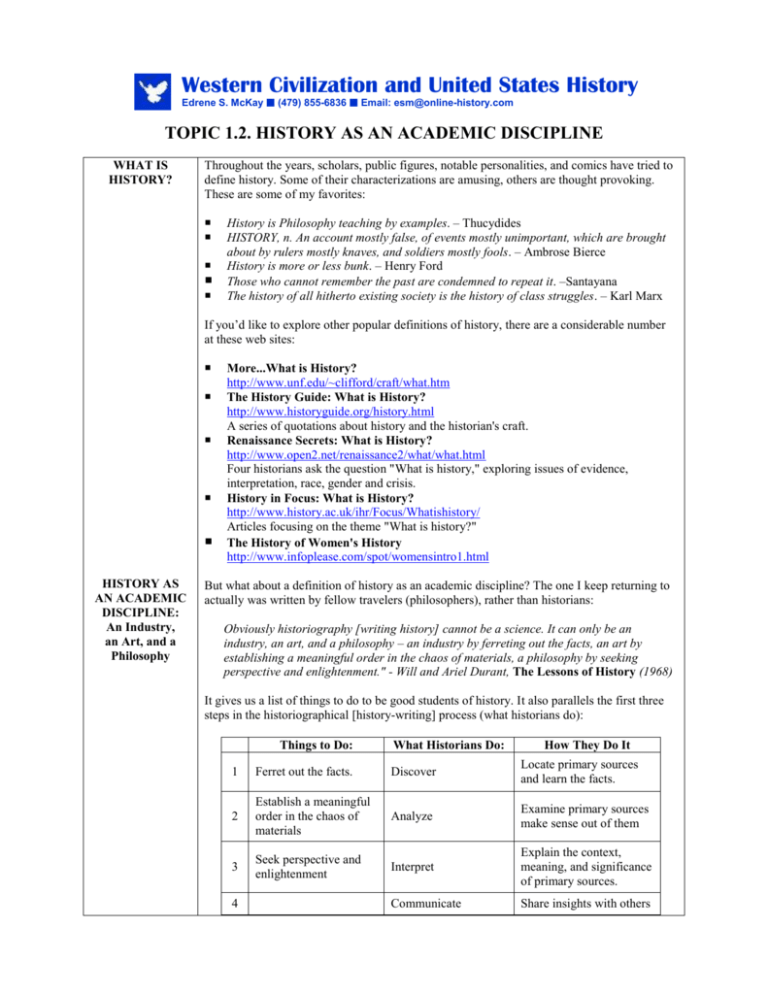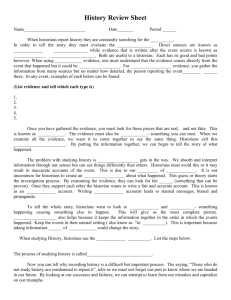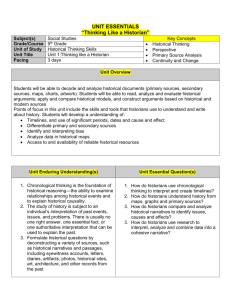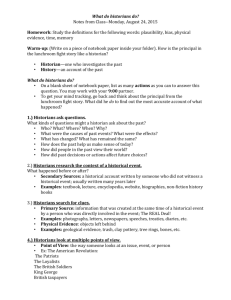Topic 1.2. History as an Academic Discipline - Online
advertisement

Western Civilization and United States History Edrene S. McKay (479) 855-6836 Email: esm@online-history.com TOPIC 1.2. HISTORY AS AN ACADEMIC DISCIPLINE WHAT IS HISTORY? Throughout the years, scholars, public figures, notable personalities, and comics have tried to define history. Some of their characterizations are amusing, others are thought provoking. These are some of my favorites: History is Philosophy teaching by examples. – Thucydides HISTORY, n. An account mostly false, of events mostly unimportant, which are brought about by rulers mostly knaves, and soldiers mostly fools. – Ambrose Bierce History is more or less bunk. – Henry Ford Those who cannot remember the past are condemned to repeat it. –Santayana The history of all hitherto existing society is the history of class struggles. – Karl Marx If you’d like to explore other popular definitions of history, there are a considerable number at these web sites: HISTORY AS AN ACADEMIC DISCIPLINE: An Industry, an Art, and a Philosophy More...What is History? http://www.unf.edu/~clifford/craft/what.htm The History Guide: What is History? http://www.historyguide.org/history.html A series of quotations about history and the historian's craft. Renaissance Secrets: What is History? http://www.open2.net/renaissance2/what/what.html Four historians ask the question "What is history," exploring issues of evidence, interpretation, race, gender and crisis. History in Focus: What is History? http://www.history.ac.uk/ihr/Focus/Whatishistory/ Articles focusing on the theme "What is history?" The History of Women's History http://www.infoplease.com/spot/womensintro1.html But what about a definition of history as an academic discipline? The one I keep returning to actually was written by fellow travelers (philosophers), rather than historians: Obviously historiography [writing history] cannot be a science. It can only be an industry, an art, and a philosophy – an industry by ferreting out the facts, an art by establishing a meaningful order in the chaos of materials, a philosophy by seeking perspective and enlightenment." - Will and Ariel Durant, The Lessons of History (1968) It gives us a list of things to do to be good students of history. It also parallels the first three steps in the historiographical [history-writing] process (what historians do): Things to Do: What Historians Do: How They Do It 1 Ferret out the facts. Discover Locate primary sources and learn the facts. 2 Establish a meaningful order in the chaos of materials Analyze Examine primary sources make sense out of them 3 Seek perspective and enlightenment Interpret Explain the context, meaning, and significance of primary sources. Communicate Share insights with others 4 History as an Academic Discipline PRIMARY SOURCES Page 2 One of the most exciting ways to study history is through primary sources. The distinction that the Library of Congress makes between primary and secondary sources is an excellent one: Primary sources are actual records that have survived from the past, such as letters, photographs, articles of clothing. Secondary sources are accounts of the past created by people writing about events sometime after they happened. How Historians Use Primary Sources Historians discover primary sources in archives and attics, put order into the chaos of materials, analyze and interpret them, and then communicate what they have learned to others. Historians speak to us in behalf of the men and women of the past. However, the men and women of the past speak directly to historians – through letters, diaries, newspaper ads, public documents, photographs, remnants of clothing, furniture, tools, and other artifacts. Using primary sources gives students of history an opportunity to enter the laboratory and to do what historians do. If you were taking a biology course, there would be a laboratory component and you would have to dissect worms, grasshoppers, and other unspeakable things – just like a biologist does. In this course, you will have an opportunity to discover, analyze, interpret, and communicate primary sources – just like the historian does. And there won’t be any formaldehyde involved. I promise. Library of Congress Activity To get a better understanding of primary sources, you might want to visit the Library of Congress web site and read what they have to say about primary sources and the historical record. What Are Primary Sources? http://memory.loc.gov/ammem/ndlpedu/lessons/psources/source.html You might also enjoy the Mindwalk Activity at the Library of Congress web site. http://memory.loc.gov/ammem/ndlpedu/lessons/psources/mindwalk.html RELIABILITY Always Based on Primary Sources Students often raise some good questions about truth and reality and whether we can ever know the truth about the past. But we aren’t left completely adrift to determine what’s fact and what’s fiction. There are some ways we can figure out whether the history we are reading is reliable. History written by professional historians is the most reliable because it is based on primary sources that are subjected to a great deal of scrutiny before they are accepted. As you might suspect, primary sources, written by people who participated in the events, can be emotional, exaggerated, or in some other way distorted. So historians have to examine those sources, evaluate them, and compare them to other accounts before accepting them as true. Subject to a Review Process But can professional historians be trusted to tell the truth since they, too, have points of view? It's really not that difficult to insure the accuracy of what you read. There is a review process that insures high quality work. When historians publish books or journal articles, their work is refereed (or judged) by a panel of experts in the field before it can be published. This way they check up on each other to insure accuracy. Then after it is published, other experts in the field publish detailed reviews in prestigious journals like the American Historical Review, the Journal of American History, and William and Mary Quarterly. If the work has a "spin" or personal interpretation that is not supported by the facts, it will come out in the review process and the historian's work will not be respected. Proper Credentials But how does the layman know if an author has the proper credentials or not? You won't find sources signed by John Doe, professional historian. But there are ways to determine the background and training of an author. If it's a book, the jacket usually gives you this History as an Academic Discipline Page 3 Information. Look for a Ph.D. in history. Sometimes this also appears in a short biographical sketch inside the book. If it’s an article, most journals and magazines indicate the author's credentials in a sidebar. If the article comes from the Internet, it may be more difficult to tell. But usually authors tell you something about themselves. Reputable Organizations Other indications of quality are: an edu website, a course-related website, or a website created for PBS, network television, or non-profit organizations. When groups like these get involved, they have reputations to uphold, so they are careful to consult professionals. If you are in doubt, go to Amazon.com and see what else the author has written and read some of the reviews published there. Keep in mind, however, these reviews were written by people who buy books, not professional historians. If the work is important enough to be considered by the professionals, you’ll find reviews in the journals I mentioned. Academic Freedom We are fortunate here in the United States that historians have academic freedom and are not controlled by the government. For example, there are historians and other academics who do not approve of the war in Iraq and are already collecting material to make their case. There's even an organization called Historians Against the War (HAW). So in this country academics are not puppets of the government like they are in totalitarian or authoritarian states. Children’s Textbooks May Be Less Reliable What appears in the textbooks, however, may be another story. Unfortunately, the selection of textbooks in elementary and high schools is controlled by school boards, ordinary citizens who often have a misguided sense of patriotism and want students to have only the highest respect for their country and its leaders. So what students read may be much less reliable than what we read as adults. IS IT GOOD HISTORY? A Defense of the Founders I have a challenge for you. Go to this website: http://www.vindicatingthefounders.com and poke around a bit. See what you can find out about Thomas G. West and his book Vindicating the Founders: Race, Sex, Class, and Justice in the Origins of America (1997). It’s described at the website as “a defense of the Founders' views and actions on slavery, women's rights, property rights, voting rights, and other controversial issues.” Then try to figure out if this is good history. See if you can come up with answers to some of these questions: Distortion of the Past Who is the author? What are his credentials for writing a book on American history? Where did he get his information? Was it from primary or secondary sources? Did he interpret the sources correctly? Are his statements supported by facts or are they merely argumentative? Who reviewed the book (customers, people from other academic disciplines, or professional historians?) Are the reviews favorable or unfavorable? Is the book reliable (based on the author’s or organization’s credentials), credible (based on the ability to verify the information), objective (an unbiased viewpoint)? In short, is this book fact or fiction? Japan provides us with an excellent case history of the distortion of the past. I think you’ll find it interesting to read this short article about Japan’s controversial history textbook and a few of the reactions to it. See if you can answer these questions: How has Japan distorted its history in recent years? What do you think prompted this misrepresentation of the past? What are the potential consequences of this behavior? Japanese Govt Officially Approves Controversial History Textbook http://english.people.com.cn/english/200104/03/eng20010403_66717.html History as an Academic Discipline Page 4 These are various reactions to the textbook: Nanjing Massacre Survivors Protest Japan's Approval of Distorted History Textbook http://english.people.com.cn/english/200104/06/eng20010406_66955.html Seoul-Tokyo Ties Expected to Sour Over Japanese Textbook Issue http://english.people.com.cn/english/200104/04/eng20010404_66843.html Japanese Scholars Appeal for Historical Truth in Textbooks http://english.people.com.cn/english/200012/22/eng20001222 Roundup: Japanese Textbook Arouses Indignation http://english.people.com.cn/english/200103/24/eng20010324_65876.html Chinese People Condemn Japan for Revising Textbook http://english.people.com.cn/english/200104/04/eng20010404_66851.html Japan Should Have Correct Conception of Past History: Vietnamese Spokeswoman http://english.people.com.cn/english/200104/06/eng20010406_66978.html THINKING ABOUT THIS SUBJECT What is your favorite definition of history? Why? Does your definition of history relate to any of the steps in the four-step historiographical process of discovery, analysis, interpretation, and communication? Explain. What would a future historian be able to tell about your life and your society based on evidence of your daily activities that might be preserved for the future? (Base your answer on the records you kept during a 24-hour period.) If future archaeologists had the materials listed below, what could they infer or conclude about your life? What might the materials tell historians about your family, community, region, and/or nation? The trash you have thrown away; Material objects you use every day (coins, paper money, stamps, computers); Objects in the place you live (especially in your bedroom); Items in your automobile. Watch an episode of West Wing and keep records of all the evidence, both public and private, that historians might be able to use in the future to tell the story of the Bartlett administration. What’s on your list? What kinds of records would you find in the White House today that you would not have found in Washington’s day? Why is it important for history to be reliable? If one of the purposes of history is to learn from the past, why do we keep making the same mistakes? What makes for good history? Is reliability, credibility, and objectivity enough?







